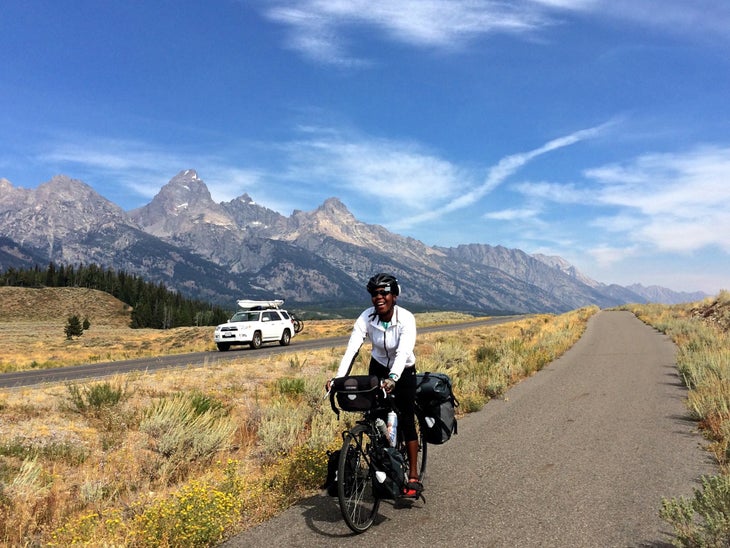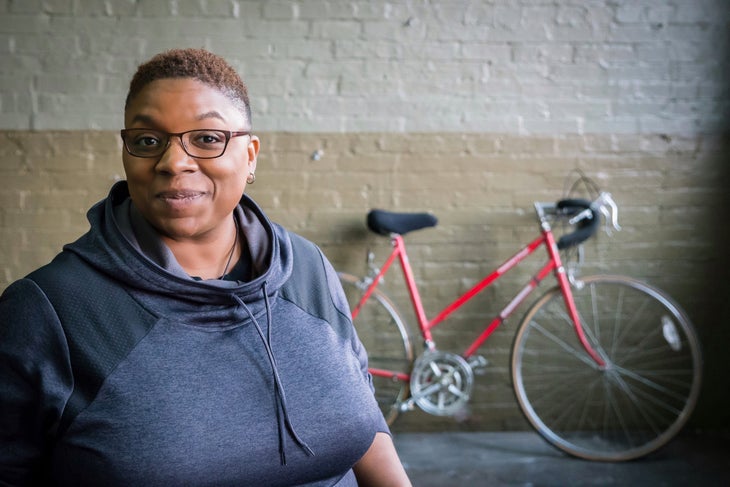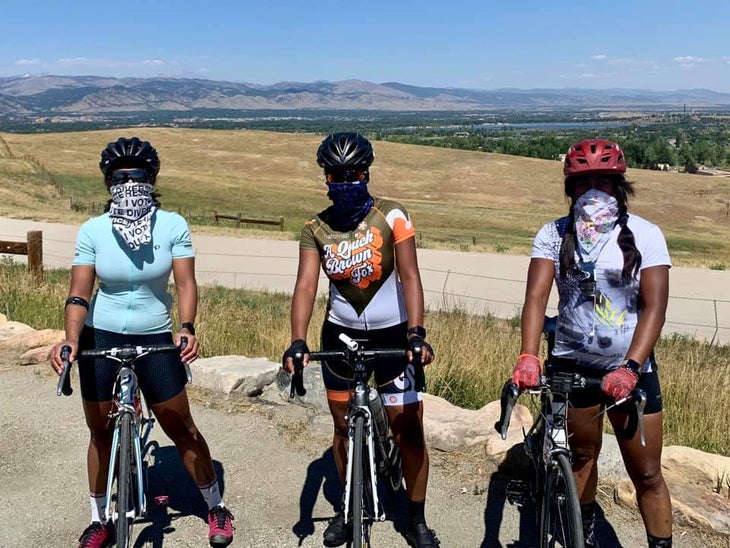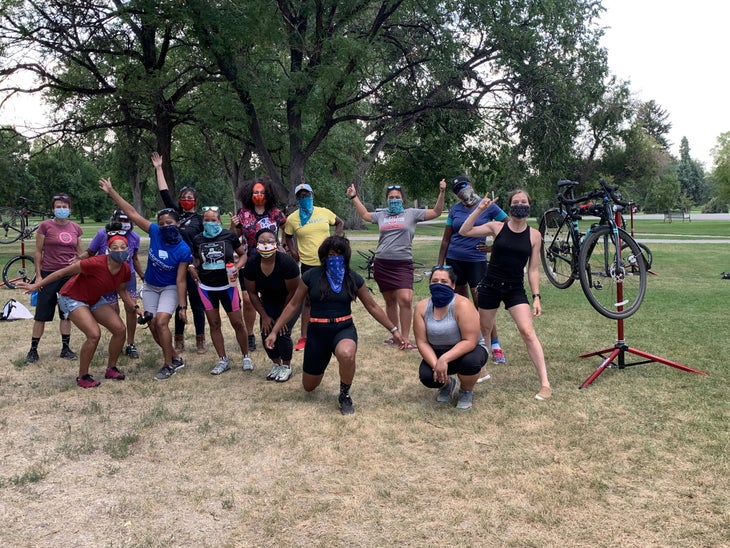Heading out the door? Read this article on the new Outside+ app available now on iOS devices for members! Download the app.
When Stephanie Puello was halfway through her bike tour on the Trans America Trail in 2016, it dawned on her that she hadn’t seen many people of color riding the trail. She also realized that she hadn’t seen many women, either. She became curious about how many other Black women had ridden the coast to coast route before, and around Kansas, she began to ask the hosts that she and her boyfriend would stay with along the way.
“‘Have you ever hosted a Black woman on the Trans Am before?’” Puello would ask. “And, most would say ‘no.’”
When she and her boyfriend passed through Missoula, home of the Adventure Cycling Association, she asked a historian at the organization for the demographic details of cyclists who used the route. They said that they didn’t keep track, which only engrossed her more. Was it possible she was the first Black woman to ride the trail, and if not, who had done it before her?

One hundred and one days after they started, she and her boyfriend finished the cross-country route and went home to Denver, which was a triumph in its own right. But Puello’s journey had given her much more to think about than miles.
Puello had heard about Black Girls Do Bike (BGDB), the nationwide “community of women of color who share a passion for cycling,” but there was no chapter of the organization in Denver where she lived. When she got home from the Trans Am, she reached out BGDB’s founder Monica Garrison to see about creating one. In July of 2017, she led its first group ride.
Black girls do bike
Seven years ago, Garrison created a Facebook page intended to become a space for Black women interested in cycling. She began by posting about how much she loved riding and sharing pictures and answering questions. Within months, she received a message from a woman in Florida, asking if she could use the name of the page, Black Girls Do Bike, for a riding group.
“I initially resisted because that wasn’t the plan and I didn’t know logistically what it would involve,” Garrison said. “But ultimately, I told her, if we could get people riding with groups in their areas, then it might work. Once we had a chapter there, then other cities were like ‘wow!’ It was totally unexpected.”

Now, the Denver arm of BGDB that Puello leads is one of 85 chapters nationwide. The groups vary in size from the low hundreds to 1,500 (in Atlanta). Texas alone has five chapters. Garrison says that both the pandemic and the spotlight on issues of racial injustice and inequality have brought more eyes to BGDB. Increases in followers of the group’s social media pages have jumped from a few hundred every couple of weeks to thousands. Garrison’s own email inbox is full, mostly of emails from well-meaning people who aren’t quite sure what they’re asking for.
“It’s a bit surreal,” she said. “But overall it’s good. People are realizing we’re here and have been doing the work all along.”
Garrison has always said that the work of BGDB is encouraging Black women to improve their lives, whether that be their physical or mental health, through cycling. Even in light of recent frank conversations about cycling’s complicity in perpetuating systemic racism, she challenges the notion that BGDB needs to redefine its original vision.
“Some people say being a Black person on a bike is a political statement, but the work we do, even if it’s inadvertently a statement, we’ve already been doing it,” she said. “I don’t think we need to shape our purpose to align with a movement, we just need to go a little harder doing what we’ve been doing.”
A safe space to talk about bikes
Before Puello became involved in the Denver chapter of Black Girls Do Bike in 2017, she had heard of the group, along with similar ones like the Denver chapter of Outdoor Afro and Black Girls Trek. She wasn’t particularly active in them but followed them on social media and looked forward to potentially becoming part of those communities.
“I’m from Miami, which is so much more diverse than Denver, so having those spaces for Black women and WOC was a nice refuge, conceptually at least,” Puello said. “Just knowing they existed was comforting for me.”
When Garrison founded BGDB, she hoped that the group would be a space, both literal and figurative, for Black women and WOC to ask questions, share experiences, and organize group rides. If something else became important to a chapter’s ‘shero’ (the leadership role that Puello has in Denver), then Garrison wanted them to feel empowered to use the space for that, too.
“The ladies should be using BGDB around whatever social issues they find important,” she said.

Lately, Puello has become involved in leading protest/solidarity rides around Denver. Although the rides aren’t affiliated with BGDB, she shares them on the group’s Facebook page. She’s not sure what the appetite is for them, but it’s her way of using the platform for a social issue that’s meaningful to her.
Otherwise, the Denver BGDB Facebook page is peppered posts from women looking for someone to ride with, or updates on new kit design, or questions about gear. Sometimes, there are invitations to maintenance clinics or skills workshops. With the continuous engagement about cycling-related topics, it feels like one of many cycling-centric group pages.
Yet Puello believes that women come to BGDB not because it’s necessarily the best place to get information but because it’s the safest.
“People come to this group first, even if it’s a question about bike parts,” she said. “They feel more comfortable asking questions and not being judged. People are not only willing to help, but if they post in this group, they might even be more likely to find a Black-owned bike shop or a Black mechanic.”
“Or, how to use a helmet when you have dreadlocks or an afro. Black women take care of their hair very differently and would never bring that up in a group of white people. Having this space has been really important in having that kind of comfort level.”
Filling the gap — and leading the way
Back to Monica Garrison’s overflowing inbox: Although the cycling industry has recently spoken up to say that it wants to be a more inclusive space and that it is ‘listening,’ many at the grassroots level wonder how seriously it’s taking the newfound commitment to diversity. Garrison says that she is hopeful the interest turns into something tangible.
“I get that question a lot [how to get more people of color on bikes],” Garrison said. “I think if all things were equal you’d see yourself reflected in all aspects of cycling. As a person of color, I don’t see that. We know things aren’t equal because there’s not a reflection in the quality of advertising and in other aspects of the industry.”

Groups like Black Girls Do Bike are therefore filling the gap — and leading the way. USA Cycling recently announced a partnership with BGDB that will support initiatives that aim to bolster youth ridership, community participation, and racing excellence. It’s a start, but in the meantime, the real work continues to be done at the grassroots level.
“We’re the ones that are truly engaged and in touch with local communities and what the needs are,” Puello said. “We’re getting people together and also just experiencing the tokenization and marginalization and exclusion from the sport. What we do is more focused, and while the number of people we’re able to engage might be smaller, it’s real.”